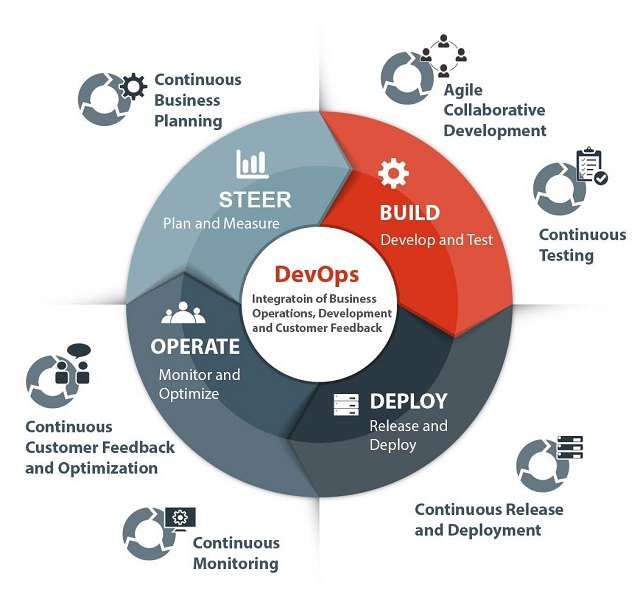Technology has no doubt, changed the way consumers interact with products. It has also leveled how we deliver value, with a focus on immersive and engaging products. But, how can you guarantee innovation, disruption, and digital transformation in today’s fast-moving world? DevOps practices, Lean thinking, Cloud Computing and IT outsourcing teams are a few of the tools that can be used to catapult your company forward in a high-tech business environment.

DevOps practices are a powerful tool to accelerate growth and scale up businesses of all sizes. Contact us to learn more about how to implement DevOps.
Living up to customer expectations can be a grueling process when you lack the tools to tackle technical challenges, the speed to outpace competitors, and the time to plan out your business strategy.
Implementing DevOps practices will provide you with all of this and more.
In order to seize market opportunities, you must start from the inside out and build an internal culture of collaboration centered on Lean thinking and an Agile mindset that focuses on continuous improvement. It is also necessary to back all of this theory up with a solid IT system that supports your business processes. This is what DevOps practices will help you achieve – and IT outsourcing can quickly provide you with technical talent when time is of the essence.
“It’s not just about development and operations collaborating, it’s getting every silo, every part of the business, of the enterprise and the organization collaborating to meet business goals.” Patrick Debois (Interview published by BMC)
If you’re looking to scale up your business you should first learn about DevOps and how it will influence your company. You should also determine where you will get your extra manpower, where it will come from (either internal recruitment or IT Outsourcing) and whether or not this extra help will be able to implement DevOps practices.
Defining DevOps practices
DevOps is a set of practices and a culture, both of which encourage teams and business owners to strive for continuity at every stage of their product’s journey. It puts automation at the core of ITOps to fuel business-focused development, deployment and IT infrastructure management.
DevOps practices are based on Agile and Lean principles and apply throughout the entire product development lifecycle. These practices are applicable when coming up with your initial idea, throughout development and release, to product improvement and adaptation. DevOps combines people, processes and technology to support robust product development and minimize time to market as well as time to value.

Source : Agilest
The foundation of DevOps is based on collaboration. Specifically, the collaboration between business owners, development, operations and quality assurance teams. All these groups must work together as a cohesive unit in order to to deliver value-added technology continuously and consistently. It takes a lot of different resources to quickly and accurately identify customers’ needs while remaining flexible enough to make rapid adjustments.
“An organization that has figured out that it will be learning and will need to continuously be improving collaboration between people with different skills in order to improve their quality, whether they call it DevOps or not, is probably one that has truly adopted DevOps.” Kris Buytaert (Interview published by Linux.org)
How will your business benefit from implementing DevOps practices?
DevOps is all about automation and end-to-end collaboration. It eliminates communication barriers and enables employees to identify necessary changes earlier to react to these needs swiftly. This collaboration will help you produce a better product development roadmap and will give you significant advantages:
Product-centric added value
- Resource optimization in terms of costs, time spent, and people involved
- Streamlined development processes that reduce technical debt through improved waste management
- Faster alignment to latest tech trends by implementing Infrastructure as Code and automating update / upgrade tasks
- Proactive continuous monitoring performed automatically, ensuring faster reaction to technical challenges and more reliable software
Customer-centric added value
- Improved delivery capabilities allowing you to deliver more often and reduce the time it takes for an idea to enter production
- Enhanced customer experience through quick feedback-gathering mechanisms
- More opportunities to innovate by automatically testing your product in its early stages of development and collecting market responses to tailor it accordingly
“Software innovation, like almost every other kind of innovation, requires the ability to collaborate and share ideas with other people, and to sit down and talk with customers and get their feedback and understand their needs.” Bill Gates
A study conducted by the SANS Institute concludes that DevOps-enabled processes outperform traditional development methods in many respects:
- 200x more deployments, with cycle times reduced from 9-12 months to 1 day
- 24x faster recovery in case of infrastructure failure, also DevOps teams fail 1/3 as often
- 29% more time spent on new work and 22% less time on unplanned work
Learn more about DevOps and Continuous Monitoring
Why consider IT outsourcing?
IT Outsourcing is a solution that companies of any size use when they feel overwhelmed by technological advances or financial challenges. However, IT Outsourcing does not need to be considered a last resort, but rather a high-value strategy to implement at the very beginning of your project.
Outsourcing gives you proven competitive edge in terms of time-to-market, costs and technical skills. It also opens up an array of services to support or complement your product development. By outsourcing your project you will be able to:
- Set up an efficient kick-off process that will get your project up and running in 2 weeks or less
- Access in-demand profiles such as DevOps Engineers or others your team is lacking
- Bypass a lengthy recruitment process, as with outsourcing it is possible to ramp up a team in just 2 weeks
- Reduce IT-related costs by up to 40%, depending on the location and product specifics
- Reinforce your product vision and branding with growth hacking strategies: for example, some IT service providers can supply strategic design, digital marketing, content writing and other related services
Learn more about why IT outsourcing is a perfect solution for developing an MVP
Case Study: DevOps for Continuous IT Monitoring
At Pentalog, one of our jobs as DevOps practitioners is to provide 24/7 system availability which we achieve through automation. This allows us to take a Continuous Monitoring approach to IT infrastructure management that our clients are particularly satisfied with. Our teams of DevOps Engineers in Latin America, Europe and Asia have joined forces to supervise production and development environments by utilizing time zone differences to our clients’ advantage, allowing them to cover a broader range of working hours.
Increase in IT system resilience
The story of one of our clients, a digital imaging specialist, speaks for itself: When the client began their project they had 2 people working night shifts, trying to fill a time gap that was essential to their ITOps, but did not manage to make any major improvement in terms of system availability. After choosing to outsource their DevOps practices, they have significantly increased their resilience capacity and have managed to ensure 24h Continuous Monitoring of their IT system without forcing people work overtime or night shifts. They gained time, saved money and are now able to act proactively rather than reactively, to ITOps challenges.
24/7 IT system supervision
Another client of ours, a provider of SaaS solutions for the retail industry, had a similar experience. Their primary need was 24h supervision for their IT system. How did they achieve it? By extending their ITOps with teams working in different locations: Vietnam and Latin America. Choosing 2 complementary destinations for their DevOps outsourcing needs resulted in more flexibility and wider coverage. It resulted in a more reliable IT system that could be restored faster and more easily. Although it wasn’t their primary objective, their collaboration also brought competitive prices and significant cost reductions for their ITOps.
IT infrastructure tune up
Another major intervention performed by Pentalog’s DevOps teams focused on tuning up the IT infrastructure of a provider of education solutions for healthcare professionals. Their platform was running on an outdated platform deployed on individual physical servers for each component (web, database etc). This significantly lowered its availability and created significant security risks. Their infrastructure was error intolerant and not scalable.
Our solution was to transfer their existing IT infrastructure to AWS as well as ensure complete platform virtualization and module clustering to increase platform availability. We paired up our migration services with a 24/7 monitoring service by involving three of our DevOps teams worldwide. Their new platform is now more dynamic, significantly more scalable and has successfully adapted to handling an increased number of visitors. Maintenance tasks such as upgrades or specific deployments became easier to perform with minimum downtime and a minimal impact on platform continuity.
Development assistance and emergency monitoring
Another client of ours, an e-commerce business in the wine industry, chose our DevOps services for two specific interventions: DevOps assistance for developers via a team in Romania and 24/7 emergency monitoring through a collaboration with our teams spread on three continents – Europe, Asia and Latin America. By applying DevOps, multiple platform actions have now been automated. This allowed our client to optimize their server architecture and hosting costs, as well as overall infrastructure management costs. It has also allowed them to react promptly in critical situations.
What about your story? Does your Dev team still shoulder a lot of manual work to deliver quality software? Is your company in need of a more reliable IT infrastructure to support your growth strategy? Are you a forward-thinker looking for ways to scale up your business?
To fuel your growth, one thing is sure: “The key is to embrace disruption and change early. Don’t react to it decades later. You can’t fight innovation.” Ryan Kavanaugh
Contact us today to learn more about growth hacking with DevOps practices, Cloud Computing and IT outsourcing.

 (11 votes, average: 4.73 out of 5)
(11 votes, average: 4.73 out of 5)








